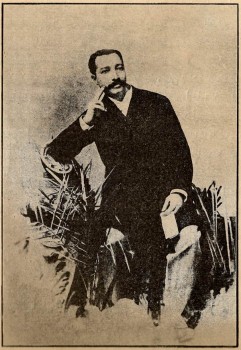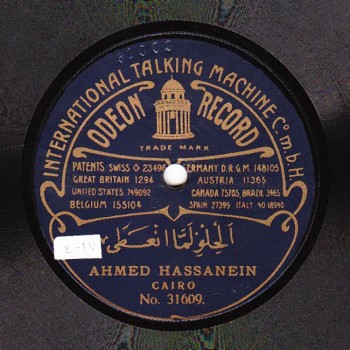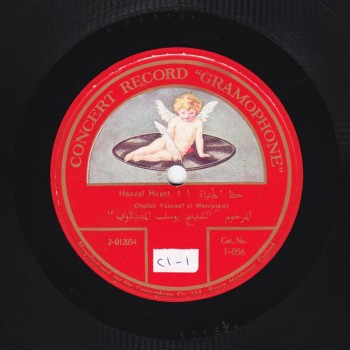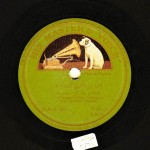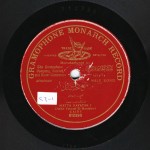 The Arab Music Archiving and Research foundation (AMAR), in collaboration with the Sharjah Art Foundation (SAF), presents “Min al-Tārīkh”.
The Arab Music Archiving and Research foundation (AMAR), in collaboration with the Sharjah Art Foundation (SAF), presents “Min al-Tārīkh”.
Dear listeners,
Welcome to a new episode of “Min al-Tārīkh”.
This is the fourth and last part of ‘Abduh al-Ḥāmūlī’s biography, including his personal life, his artistic career, as well as life in his era.
We have already talked a lot about his personal life, and started discussing his artistic career.
Today, we will resume our discussion held in Paris with Prof. Frédéric Lagrange.
‘Abduh al-Ḥāmūlī only composed dawr, didn’t he?
He mostly composed dawr except for a few qaṣīda that were not qaṣīda composed like Abū al-‘Ilā Muḥammad’s.
Here is a general idea about the melodic path: ‘Abd al-Ḥayy Ḥilmī claimed that he learned qaṣīda “Arāka ‘aṣiyy al-dam‘ ” by listening to the cylinder record by ‘Abduh al-Ḥāmūlī, which implies that the latter had a melodic path that was specific to this qaṣīda, and maybe to other qaṣīda. Thus the overall melodic path imitated or improvised by ‘Abd al-Ḥayy Ḥilmī in some of his recordings was probably, if not copied, then at least inspired by ‘Abduh al-Ḥāmūlī’s performance. But, besides these general ideas –that can’t be called melodies– related to specific qaṣīda, all the others are of course dawr.
Such as?
“Allāh yṣūn dawlat ḥusnak”, “Gharāmak ‘allimnī el-nūḥ”, and “Kunti fēn w-el-ḥubbi fēn”… In fact, Al-Khula‘ī attributed “Ahīn el-nafs we-itzallal ‘ilēk” to Al-Ḥāmūlī, even though other sources attribute it to another composer.
Aḥmad Abū Ghunaym.
There is also “Yā munyit el-arwāḥ”, “Kulli yōm ashkī min jirāḥ albī”, and “El-ḥelū lammā in‘aṭaf”…
This last one is a dawr ‘ala al-dārij, a rare occurrence.
The dawr is ‘ala al-dārij. We should listen to an excerpt.
(♩) (Aḥmad Ḥasanayn)
There is also “Bi-siḥr el-‘ēn tarakt el-albi hāyim” and “Adduh el-mayyās zawwid wajdī”.
Sheikh Salāma Ḥigāzī performed his own version of “Adduh el-mayyās zawwid wajdī” ’s melody, which I think is almost the same as ‘Abduh al-Ḥāmūlī’s.
To have an idea about ‘Abduh al-Ḥāmūlī’s melody, we can listen to ‘Abd al-Ḥayy Ḥilmī’s version, then compare this version to the beginning of Salāma Ḥigāzī’s performance. We will find out how different the versions are.
There is a third recording, made at the Cairo Conference in 1932.
(♩)
Salāma Ḥigāzī dealt with “Bi-siḥr el-‘ēn” as he dealt with “Adduh el-mayyās”.
Exactly. This highlights the controversial relationship –discussed previously– between the composer and the creative performer.
According to Khalīl Muṭrān, Salāma Ḥigāzī created onto Sī ‘Abduh’s creation.
Exactly. Two creators put together… Creation onto creation…
(♩)
The dawr composed byAl-Ḥāmūlī include: “Fu’ādī min liḥāẓak”, “Matta‘ ḥayātak bi-el-aḥbāb” –discussed previously–, and “El-ḥubbi ṣabbaḥnī ‘adam” –recorded by ‘Abd al-Ḥayy Ḥilmī.
It was also recorded by ‘Abduh al-Ḥāmūlī on a cylinder record.
Let us listen to it.
(♩)
There is also “Jaddidī yā nafs ḥaẓẓik” and “Ḥaẓẓ el-ḥayāt”. The latter is a magnificent dawr and one of the most beautiful he ever composed, I think.
(♩) (Yūsuf al-Manyalāwī)
‘Abduh al-Ḥāmūlī died in May 1901.
‘Abduh al-Ḥāmūlī had been suffering from pulmonary tuberculosis for years when he died on May 12th 1901 in Ḥalwān from this illness.
Kāmil al-Khula‘ī said that he recorded cylinder records in his last days in order to earn a living and pay the expenses caused by his illness, i.e. according to Kāmil al-Khula‘ī, ‘Abduh al-Ḥāmūlī made cylinder records out of necessity and not out of choice.
I do not agree with him, and I do not think that the period’s muṭrib were aware of the financial significance of these recordings.
Let us not forget that Egypt had not started recording yet: recording only appeared in the Middle East in 1903 when Zonophone/Gramophone arrived and recorded second-rank muṭrib mostly, not first-rank muṭrib, except for Sayyid al-Ṣaftī.
I do not doubt that these muṭrib in the late 19th century and maybe up to 1902 or 1903…
When the 2 media, i.e. the disc and the cylinder record, remained competing media in the Middle East for only 2 or 3 years… then the cylinder record completely disappeared from the media used for commercial recording.
While I think the main concern of those such as Salāma Ḥigāzī, ‘Abduh al-Ḥāmūlī, or Yūsuf al-Manyalāwī who recorded their voices on a limited number of cylinder records was to perpetuate their voice for posterity, especially that someone like ‘Abduh al-Ḥāmūlī undoubtedly knew that he was approaching the end of his life. Let us not forget that he was a very sick man who had to try this new media and leave something for posterity.
I personally agree with you, but we had to mention Kāmil al-Khula‘ī’s opinion. What do you think we should conclude with?
Let us conclude with one of these cylinder records, especially that until the 1990’s no one had the opportunity to listen to any of them, except for those 2 unique records.
Meshian copied cylinder records onto discs during WW1. The quality is almost null and we can hear more static than the voice of ‘Abduh al-Ḥāmūlī.
But in the beginning of this century, a number of cylinder records by ‘Abduh al-Ḥāmūlī among others were copied by the University of California Santa Barbara. They are available to everybody: all one has to do is visit the University’s website and download these audio files.
Finally, AMAR bought a number of these cylinder records from private collections in Egypt. Their sound quality is without exaggeration much better than the sound quality of the University of California Santa Barbara’s audio files.
Let us listen to an excerpt in ‘Abduh al-Ḥāmūlī’s voice.
But before listening to it, let us add that almost all of Egypt elegized ‘Abduh al-Ḥāmūlī at his death.
Especially the Prince of Poets.
Aḥmad Shawqī Bēh.
His Highness the Prince of Poets Aḥmad Bēh said:
Sāji‘u al-sharqi ṭāra ‘an awkārih Wa-tawalla fannun ‘ala āthārih
Salaba al-fanna alḥanu al-ṭayri fīhi W-al-matīna al-makīna min awtārih
‘Abdu bayda anna kulla mughannin ‘abduhu Fī iftinānihi wa-ibtikārih
Kāna mizmārahu fa-aṣbaḥa Dāwūdu Ka’īban yabkī ‘ala mizmārih
Ma‘bidu al-dawlatayni fī Miṣra Isḥāqu Samiyyayni rabbi Miṣra wa-jāriḥ
Fī bisāṭi Rashīdi yawman Wa-yawman fī ḥima Ja‘farin wa-ḍāfi sitārih
Yasma‘u al-laylu minhu fī al-fajri yā laylu Fa-yuṣghī mustamhilan fī firārih
Fuji‘a al-nāsu yawma māta al-Ḥāmūlī Bi-dawā’i al-humūmi fī ‘uṭārih
Wa-zamānin anta al-riḍā min baqāyāhu Wa-anta al-‘azā’u min āthārih
Kāna li-al-nāsi layluhu ḥīna tashdū Laḥiqa al-yawmu laylahu bi-nahārih
Beautiful!
With the voice of ‘Abduh al-Ḥāmūlī, we reach the end of our episode about him.
We will meet again in a new episode of “Min al-Tārīkh”.
“Min al-Tārīkh” is brought to you by Mustafa Said.
- 221 – Zakariyya Ahmed – 12 (1/9/2022)
- 220 – Zakariyya Ahmed – 11 (1/9/2022)
- 219 – Zakariyya Ahmed – 10 (11/25/2021)
- 218 – Zakariyya Ahmed – 9 (10/26/2021)
- 217 – Zakariyya Ahmed – 8 (9/24/2021)
- 216 – Zakariyya Ahmed – 7 (9/4/2021)
- 215 – Zakariyya Ahmed – 6 (8/28/2021)
- 214 – Zakariyya Ahmed – 5 (8/6/2021)
- 213 – Zakariyya Ahmed – 4 (6/26/2021)
- 212 – Zakariyya Ahmed – 3 (5/27/2021)
- 211 – Zakariyya Ahmed – 2 (5/1/2021)
- 210 – Zakariyya Ahmed – 1 (4/28/2021)
- 209 – W-al-Lāhi lā astaṭī‘u ṣaddak 2 (4/6/2017)
- 208 – W-al-Lāhi lā astaṭī‘u ṣaddak 1 (3/30/2017)
- 207 – Bashraf qarah baṭāq 7 (3/23/2017)

